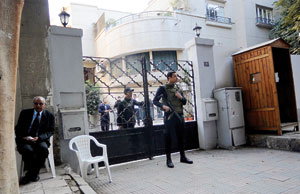CQ WEEKLY – VANTAGE POINT
Feb. 4, 2012 – 12:18 p.m.
Crashing the Egyptian Parties
By Emily Cadei, CQ Staff
The Egyptian government’s raid late last month on the Cairo offices of the International Republican Institute and the National Democratic Institute made headlines, particularly since one of the executives prevented from leaving the country was Transportation Secretary

|
||
|
Governments tend to be particularly sensitive about the groups’ work with opposition parties and civil society. Relations with the government in Russia, for example, “have kind of ebbed and flowed,” says Les Campbell, the Middle East and North Africa director of the Democratic Institute, or NDI. The differences, he adds, “have always been worked out amicably.” The NDI and its counterpart, the IRI, were among a number of non-governmental groups booted out of Ethiopia in 2005. More recently, NDI staff members were prevented from entering the Persian Gulf kingdom of Bahrain several times in 2011.
While international non-governmental organizations are often viewed with suspicion by some governments, the IRI’s and NDI’s close ties to U.S. political figures and U.S. government funding draw special attention abroad, particularly from autocratic regimes.
Authorized by Congress in 1983, the two groups were established to broadly represent the Democratic and Republican parties, although they are independent nonprofits that are legally barred from having a financial or managerial relationship with the political parties. Their budgets, almost all federal money, are less than a hundred million dollars.
The only real political ties, says Campbell, are the politicians and former government officials who sit on their boards.
Sparked by President Ronald Reagan’s efforts to counter communism during the last years of the Cold War, the groups and their parent organization, the National Endowment for Democracy, fell out of favor on Capitol Hill for a time in the 1990s, when some lawmakers considered them a waste of money. However, the profiles of the NDI and IRI rose as part of President George W. Bush’s plan to spread democracy, and they have been active in many of the countries of the Arab Spring movement. Several senior Republican members of Congress sit on the IRI’s board, and current lawmakers of both parties fiercely defend them.
Having such high-profile advocates, however, can cut both ways, drawing the attention and suspicion of foreigners. In particular, critics cite instances in which the IRI was accused of trying to help pick winners and losers in leadership races in Haiti and elsewhere in South America. IRI’s president, Lorne W. Craner, acknowledged that “in the very early days — I would go all the way back to the ’80s — people made some mistakes.”
Campbell says those incidents are “not very relevant these days.”
What both groups do today is “not about promoting one set of values,” Campbell says. “We don’t try and choose outcomes.”
Foreign leaders often see it differently, which has prompted confrontation over the years. No previous incident, however, compares to the action taken by Egyptian security officials. The organizations had “never been raided by armed men” nor “had people hauled into court,” Craner says. They have also never had staffers prevented from leaving the country, as Cairo’s military-led government is now doing, much to the consternation of U.S. officials. It is, says Craner, “totally unprecedented.”
What is particularly puzzling for both organizations is that the raid came after the country held its first round of democratic elections, for which both groups were certified as election observers working at the invitation of Egypt’s election authorities. The NDI also partnered in 2011 with a range of Egyptian organizations, public and private, to put together a voter information campaign, while IRI conducted training sessions for political parties.
At this point, it should not be "an antagonistic situation for democracy organizations that are perhaps running afoul of an authoritarian government," Campbell says. But free elections or no, the episode certainly has sowed doubts about the true intentions of Egypt's new leadership — particularly on Capitol Hill.